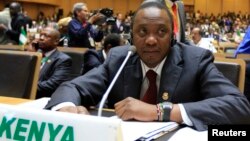PARIS —
The defense in the International Criminal Court (ICC) trial of Kenyan President Uhuru Kenyatta says "the prosecution has realized that its case has collapsed."
Defense attorney Stephen Kay told the court on Wednesday, that a prosecution attempt to blame the Kenyan government for obstruction indicates prosecutors had no real case.
At issue are financial records that prosecutors say could tie Kenyatta to 2008 post-election violence that left more than 1,000 people dead.
Kenyatta, and his deputy, William Ruto, face charges of crimes against humanity for their alleged roles in orchestrating the violence.
During Wednesday's court session, prosecution lawyer Benjamin Gumpert accused the defense of foot-dragging on turning over the records.
"One of the allegations we make against Mr. Kenyatta is that he, personally, provided very large quantities of money, which were funneled down through his intermediaries and messengers and delivered in the form of cash to the perpetrators of the violence," said Gumpert. "The request for assistance which we made, was for Mr. Kenyatta's financial records, because, we suggest, if he did indeed make such financial contributions, there would likely be records of movement of funds at the relevant time."
However, Kay argued the Kenyan government had been right to withhold the records.
"The government of Kenya has maintained consistently that requests from the prosecution should come through the court, and by that they mean the trial chamber," he said.
The prosecution says those records might indicate his role in funding Kenya's post-electoral violence six years ago which killed more than 1,000 people.
Kenyatta's trial at the ICC has already been postponed several times -- and the prosecution acknowledges it currently lacks sufficient evidence to move ahead, saying witnesses have been bribed and intimidated, and two key witnesses have dropped out.
The court's cases against Kenyatta and Ruto have fueled anger in Africa. Critics claim the court singles out Africans for its trials. For the ICC, going forward with the Kenyatta trial is important for its credibility, observers say, since a number of its other cases have collapsed.
As for the lawyer for Kenya's victims, Fergal Gaynor, dismissing the case against Kenyatta would dash hopes the ICC can deliver justice - in Kenya and elsewhere.
"The victims of this case have a legitimate expectation that this court will do all it can do to reveal the truth of the atrocities that engulfed Naivasha and Nukuru in January 2008. It would be unconscionable now to abandon the thousands of victims of this case at this state, before they have heard even a single day of trial."
Kenyatta's lawyers have asked the court to drop the charges against him. On Wednesday, the judges did not rule on requests from either side.
Defense attorney Stephen Kay told the court on Wednesday, that a prosecution attempt to blame the Kenyan government for obstruction indicates prosecutors had no real case.
At issue are financial records that prosecutors say could tie Kenyatta to 2008 post-election violence that left more than 1,000 people dead.
Kenyatta, and his deputy, William Ruto, face charges of crimes against humanity for their alleged roles in orchestrating the violence.
Uhuru Kenyatta
Uhuru Kenyatta- Sworn in as Kenya's president in April, 2013
- Former deputy prime minister, former finance minister
- 51 years old, son of Kenya's first president
- Facing crimes against humanity charges at the International Criminal Court at The Hague in relation to violence following the 2007 election
- Nominated to parliament in 2001
- Appointed to run the Kenya Tourism Board in 1999
"One of the allegations we make against Mr. Kenyatta is that he, personally, provided very large quantities of money, which were funneled down through his intermediaries and messengers and delivered in the form of cash to the perpetrators of the violence," said Gumpert. "The request for assistance which we made, was for Mr. Kenyatta's financial records, because, we suggest, if he did indeed make such financial contributions, there would likely be records of movement of funds at the relevant time."
However, Kay argued the Kenyan government had been right to withhold the records.
"The government of Kenya has maintained consistently that requests from the prosecution should come through the court, and by that they mean the trial chamber," he said.
The prosecution says those records might indicate his role in funding Kenya's post-electoral violence six years ago which killed more than 1,000 people.
Kenyatta's trial at the ICC has already been postponed several times -- and the prosecution acknowledges it currently lacks sufficient evidence to move ahead, saying witnesses have been bribed and intimidated, and two key witnesses have dropped out.
The court's cases against Kenyatta and Ruto have fueled anger in Africa. Critics claim the court singles out Africans for its trials. For the ICC, going forward with the Kenyatta trial is important for its credibility, observers say, since a number of its other cases have collapsed.
As for the lawyer for Kenya's victims, Fergal Gaynor, dismissing the case against Kenyatta would dash hopes the ICC can deliver justice - in Kenya and elsewhere.
"The victims of this case have a legitimate expectation that this court will do all it can do to reveal the truth of the atrocities that engulfed Naivasha and Nukuru in January 2008. It would be unconscionable now to abandon the thousands of victims of this case at this state, before they have heard even a single day of trial."
Kenyatta's lawyers have asked the court to drop the charges against him. On Wednesday, the judges did not rule on requests from either side.




